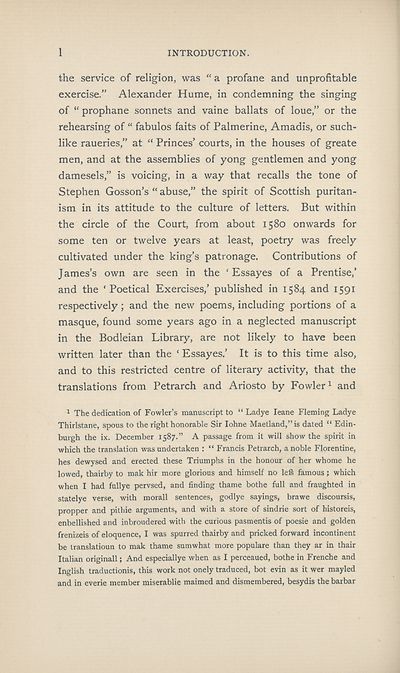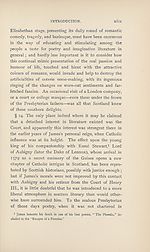Download files
Complete book:
Individual page:
Thumbnail gallery: Grid view | List view

1
INTRODUCTION.
the service of religion, was “ a profane and unprofitable
exercise.” Alexander Hume, in condemning the singing
of “ prophane sonnets and vaine ballats of loue,” or the
rehearsing of “ fabulos faits of Palmerine, Amadis, or such¬
like raueries,” at “ Princes’ courts, in the houses of greate
men, and at the assemblies of yong gentlemen and yong
damesels,” is voicing, in a way that recalls the tone of
Stephen Gosson’s “ abuse,” the spirit of Scottish puritan-
ism in its attitude to the culture of letters. But within
the circle of the Court, from about 1580 onwards for
some ten or twelve years at least, poetry was freely
cultivated under the king’s patronage. Contributions of
James’s own are seen in the ‘ Essayes of a Prentise,’
and the ‘Poetical Exercises,’ published in 1584 and 1591
respectively ; and the new poems, including portions of a
masque, found some years ago in a neglected manuscript
in the Bodleian Library, are not likely to have been
written later than the ‘ Essayes.’ It is to this time also,
and to this restricted centre of literary activity, that the
translations from Petrarch and Ariosto by Fowler1 and
1 The dedication of Fowler’s manuscript to “ Ladye leane Fleming Ladye
Thirlstane, spous to the right honorable Sir lohne Maetland,”is dated “ Edin¬
burgh the ix. December 1587.” A passage from it will show the spirit in
which the translation was undertaken : “ Francis Petrarch, a noble Florentine,
hes dewysed and erected these Triumphs in the honour of her whome he
lowed, thairby to mak hir more glorious and himself no left famous; which
when I had fullye pervsed, and finding thame bothe full and fraughted in
statelye verse, with morall sentences, godlye sayings, brawe discoursis,
propper and pithie arguments, and with a store of sindrie sort of historeis,
enbellished and inbroudered with the curious pasmentis of poesie and golden
frenizeis of eloquence, I was spurred thairby and pricked forward incontinent
be translatioun to mak thame sumwhat more populare than they ar in thair
Italian originall; And especiallye when as I perceaued, bothe in Frenche and
Inglish traductionis, this work not onely traduced, bot evin as it wer mayled
and in everie member miserablie maimed and dismembered, besydis the barbar
INTRODUCTION.
the service of religion, was “ a profane and unprofitable
exercise.” Alexander Hume, in condemning the singing
of “ prophane sonnets and vaine ballats of loue,” or the
rehearsing of “ fabulos faits of Palmerine, Amadis, or such¬
like raueries,” at “ Princes’ courts, in the houses of greate
men, and at the assemblies of yong gentlemen and yong
damesels,” is voicing, in a way that recalls the tone of
Stephen Gosson’s “ abuse,” the spirit of Scottish puritan-
ism in its attitude to the culture of letters. But within
the circle of the Court, from about 1580 onwards for
some ten or twelve years at least, poetry was freely
cultivated under the king’s patronage. Contributions of
James’s own are seen in the ‘ Essayes of a Prentise,’
and the ‘Poetical Exercises,’ published in 1584 and 1591
respectively ; and the new poems, including portions of a
masque, found some years ago in a neglected manuscript
in the Bodleian Library, are not likely to have been
written later than the ‘ Essayes.’ It is to this time also,
and to this restricted centre of literary activity, that the
translations from Petrarch and Ariosto by Fowler1 and
1 The dedication of Fowler’s manuscript to “ Ladye leane Fleming Ladye
Thirlstane, spous to the right honorable Sir lohne Maetland,”is dated “ Edin¬
burgh the ix. December 1587.” A passage from it will show the spirit in
which the translation was undertaken : “ Francis Petrarch, a noble Florentine,
hes dewysed and erected these Triumphs in the honour of her whome he
lowed, thairby to mak hir more glorious and himself no left famous; which
when I had fullye pervsed, and finding thame bothe full and fraughted in
statelye verse, with morall sentences, godlye sayings, brawe discoursis,
propper and pithie arguments, and with a store of sindrie sort of historeis,
enbellished and inbroudered with the curious pasmentis of poesie and golden
frenizeis of eloquence, I was spurred thairby and pricked forward incontinent
be translatioun to mak thame sumwhat more populare than they ar in thair
Italian originall; And especiallye when as I perceaued, bothe in Frenche and
Inglish traductionis, this work not onely traduced, bot evin as it wer mayled
and in everie member miserablie maimed and dismembered, besydis the barbar
Set display mode to: Large image | Zoom image | Transcription
Images and transcriptions on this page, including medium image downloads, may be used under the Creative Commons Attribution 4.0 International Licence unless otherwise stated. ![]()
| Publications by Scottish clubs > Scottish Text Society publications > Old series > Poems of Alexander Montgomerie > (60) |
|---|
| Permanent URL | https://digital.nls.uk/110170769 |
|---|
| Description | A collection of over 100 Scottish texts dating from around 1400 to 1700. Most titles are in Scots, and include editions of poetry, drama, and prose by major Scottish writers such as John Barbour, William Dunbar, Gavin Douglas, and George Buchanan. Edited by a key scholarly publisher of Scotland's literary history, and published from the late 19th century onwards by the Scottish Text Society. Available here are STS series 1-3. |
|---|

